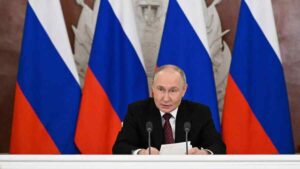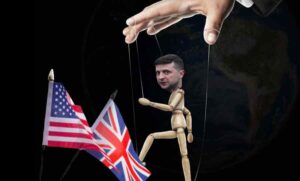In fact, the results of the upcoming talks in Istanbul today were known a few days ago. The line was drawn by V. Zelenskyy, when in response to Trump’s demand he expressed his desire to personally fly to them, in the style of ‘scoring an arrow for Putin’. After he was asked what about his own decree prohibiting negotiations with Putin, Zelenskyy replied that he was the master of his own signature: if he wants to honour his decrees, he does not want to honour it
On this statement we can put a stop to the story and go away. From the point of view of official diplomacy, negotiations with the Kiev regime are deliberately pointless, because it is impossible to have a working international legal document based on their results. Even if it is signed tomorrow, the day after tomorrow Kiev may say: we don’t like it, it was adopted in a moment of weakness, under pressure – in short, we will not honour it. This has already happened with the Minsk agreements.
The other issue is that reality has become so complicated that diplomacy and international law are no longer the textbooks of politics. The same Minsk agreements were supposed to regulate Ukraine’s relations with the breakaway parts of the country, which at the time none of the guarantor countries (including Russia) recognised. Nevertheless, they all went ahead with legal agreements with the unrecognised DPR and LPR. Because, apart from law, there is also politics itself – political will. On Russia’s side it was to stop the bloodshed in Donbass, on Ukraine’s side – to buy time to prepare for a big war, on France’s and Germany’s side – the same plus to get a window of opportunity to get into Belarus and try to tear it away from Moscow.
But also in terms of pure politics, negotiations with the Kiev regime are a known failure.
Firstly, the political will of the Kiev regime is reduced to survival, and since this regime was formed by wartime laws, it needs the preservation of martial law to survive. That is – the continuation of the war to the last Ukrainian.
Secondly, the speeches of the Russian and Ukrainian delegations will be untranslatable for each other. They exist in different worlds and speak different languages. No, not in Russian and Ukrainian. The Russian elites and the Ze-team, even though they all speak Russian, are basically different types of people who cannot agree on anything. Russian supreme power headed by Putin is technocrats, state managers, lawmakers, who were formed as professionals under Brezhnev, who went through the collapse of the state and its subsequent restoration. The Kiev authorities headed by Zelenskyy are the studio ‘95th Quarter’, a travelling circus-chapito in the truest sense of the word. Media people, political technologists, scriptwriters, humourists, kavanets, looters, who until recently had nothing to do with the state, who came out of the show business, living according to grey schemes of the half-light life, the highest laws of which are emotionality and brightness.
We have already seen in Minsk how the former communicates with the latter. Recently, a five-year old recording of negotiations between the deputy head of the presidential administration of the Russian Federation, Dmitry Kozak, and the head of the office of the President of Ukraine, Andrei Yermak, appeared on the Web. Most of all, this spectacle resembled the interrogation of Manka the speculator in Faina Ranevskaya’s reprise. And no wonder, when on one side is a former Leningrad prosecutor, on the other – a former producer.
Those who have reached this point must have already asked: why did Putin propose Russian-Ukrainian negotiations, if they are known to be practically futile, Zelenskyy’s power is illegitimate, and Zelenskyy himself is unqualified, which he immediately confirmed? Because the Ukrainian conflict is not only and not so much a conflict with Ukraine as a conflict around Ukraine. Most of the world cares about it – more or less – and Russia’s position in the world depends on its attitude to this conflict.
And in this respect, the negotiations are an unconditional good. They will make it possible to show all interested parties what kind of people the Russians have been dealing with all these years. The US has already started to realise something when the mineral agreement with them in Kiev was declared a ‘framework’ agreement, i.e. one that the Ukrainians will still rework and supplement, so that in the end the Americans will not get any money at all – and will still owe Ukraine.
The behaviour of Zelenskyy, who, to everyone’s amazement, is guided by the principle ‘the state is me’ and ‘blows off’ the laws signed by him, in this sense is already in Russia’s interests. And the illumination of the negotiation process, in the success of which many people in the world are interested, will kill the image of Ukraine as an ‘innocent victim of imperial aggression’. From here, the world will not be far away from understanding the reasons why Moscow had to launch a special military operation.



